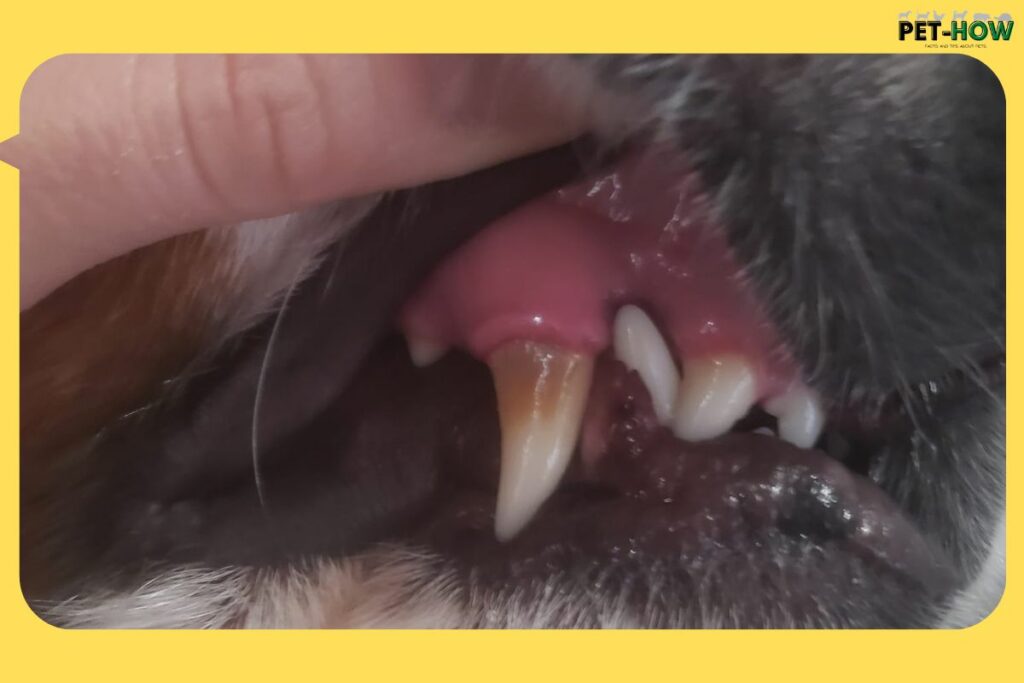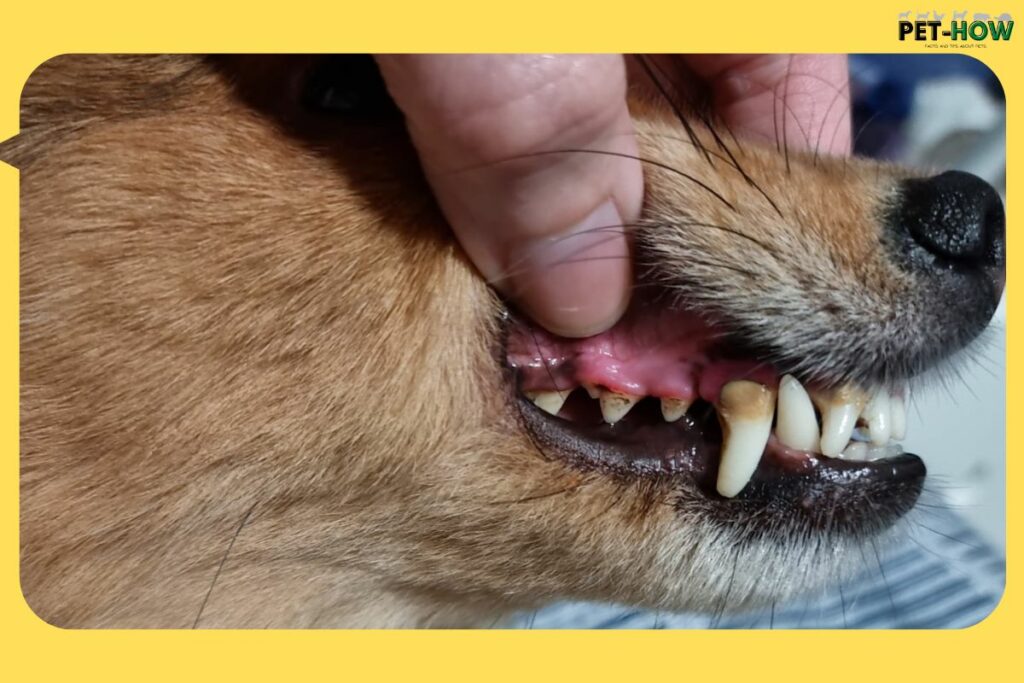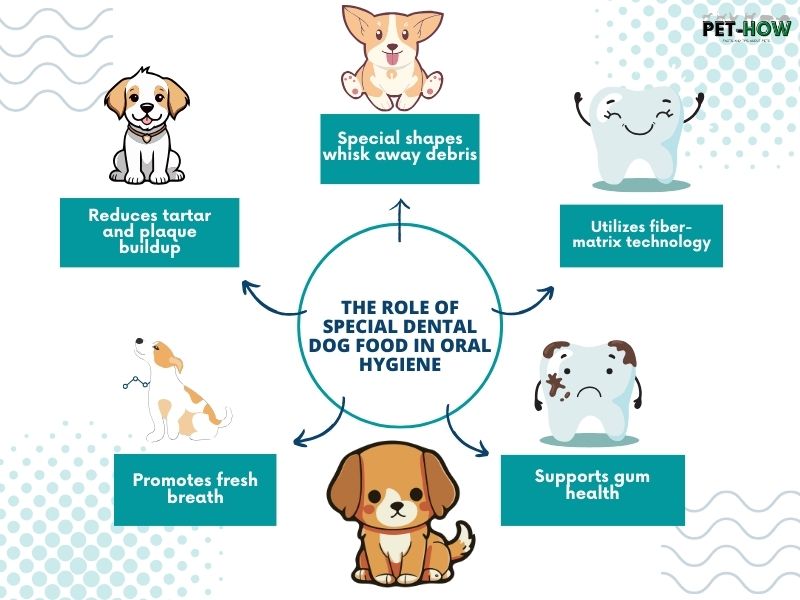Special dental dog food plays a crucial role in enhancing your dog’s oral health, and as a veterinarian, I am here to guide you through the benefits and options available.
Designed to promote dental hygiene and reduce plaque and tartar buildup, these foods are a healthy choice for your furry friend.
- Key Takeaways:
- Understanding Dental Health in Dogs
- Recommended Brands for Special Dental Dog Food
- Features of Special Dental Dog Food
- Limitations of Dry Dog Food for Dental Health
- Natural Ways to Improve Dental Health in Dogs
- The Importance of Routine Dental Cleanings
- Dental Health Diet Supplement
- The Role of Special Dental Dog Food in Oral Hygiene
- Additional Factors for Dental Health
- Conclusion
- Source Links
Key Takeaways:
- Special dental dog food is specifically formulated to improve your dog’s oral health.
- Recommended brands for special dental dog food include Hill’s Prescription Diet Dental Care, Hill’s Science Diet Adult Oral Care, Merrick Lil’ Plates Grain-Free, Royal Canin Veterinary Diet Dental, and Purina Pro Plan Veterinary Diets Dental Health.
- These foods have unique features such as fiber-matrix technology for effective teeth cleaning, special shapes to remove debris, and high levels of antioxidants for overall oral health.
- While dry dog food can help remove plaque on the surface of teeth, it may be less effective in preventing plaque and tartar buildup near the gumline.
- Incorporating natural methods like raw meaty bones, daily brushing, and routine professional cleanings can further improve your dog’s dental health.
- Feeding your dog a dental health diet can supplement their oral care, but it should not replace regular dental cleanings by a veterinarian.
Understanding Dental Health in Dogs
Maintaining good dental health is essential for your dog’s overall well-being, as it helps prevent detrimental conditions such as tartar, plaque, and dental disease.
Just like humans, dogs can develop dental issues that can impact their quality of life. Proper dental care is crucial to keep their teeth and gums healthy.
Tartar and plaque are common problems in dogs, especially if their oral care is neglected. Tartar is a hard, yellowish-brown substance that forms on the teeth when plaque hardens. Plaque, on the other hand, is a sticky film of bacteria that constantly forms on the teeth. If not addressed, tartar and plaque buildup can lead to periodontal disease and other dental issues.
“The buildup of tartar and plaque can cause gum inflammation, bad breath, pain, and tooth loss,” emphasizes Dr. Smith, a reputable veterinarian. “Regular dental care is crucial to prevent these issues and maintain your dog’s oral health.”
Providing proper dental care for your dog involves a combination of different approaches. Along with regular brushing and routine dental cleanings by a veterinarian, special dental dog food can also play a significant role.
These foods are specifically formulated with unique features like fiber-matrix technology and special shapes to help remove plaque and debris from your dog’s teeth. Additionally, they often contain high levels of antioxidants to support oral health.
What is Dental Dog Food?

Dental dog food is a specially designed diet that aids in maintaining and improving a dog’s oral health.
This type of dog food is formulated with specific ingredients and a unique kibble design to help reduce the build-up of plaque and tartar on a dog’s teeth.
The kibbles are typically larger and have a certain texture that encourages the dog to chew more, which can act like a brushing action on the teeth.
Some dental dog foods also contain special enzymes or chemicals to further assist in preventing oral diseases.
From my perspective as a veterinarian, I’ve recommended dental dog food to many dog owners as a part of a comprehensive oral health care regimen.
It’s been particularly useful for dogs who are prone to dental issues or those who are not cooperative with tooth brushing.
However, it’s important to remember that while dental dog food can certainly support dental health, it doesn’t replace the need for regular vet check-ups and professional dental cleanings.
Recommended Brands for Special Dental Dog Food

When it comes to selecting special dental dog food for your furry friend, it’s crucial to choose from reputable brands that prioritize dental care, such as Hill’s Prescription Diet Dental Care, Hill’s Science Diet Adult Oral Care, Merrick Lil’ Plates Grain-Free, Royal Canin Veterinary Diet Dental, and Purina Pro Plan Veterinary Diets Dental Health.
These brands have been trusted by veterinarians and pet owners alike for their commitment to promoting optimal oral health in dogs. Let’s take a closer look at each of these recommended brands:
| Brand | Key Features | Amazon |
|---|---|---|
| Hill’s Prescription Diet Dental Care | Formulated with fiber-matrix technology for effective teeth cleaning and reducing plaque buildup. | Check latest price |
| Hill’s Science Diet Adult Oral Care | Contains a unique kibble shape that helps whisk away debris, promoting dental health. | Check latest price |
| Merrick Lil’ Plates Grain-Free | A grain-free formula with added vitamins and minerals for overall oral health support. | Check latest price |
| Royal Canin Veterinary Diet Dental | Designed to help reduce dental plaque and tartar formation with specialized kibble texture. | Check latest price |
| Purina Pro Plan Veterinary Diets Dental Health | Contains high levels of antioxidants to support oral health and a healthy immune system. | Check latest price |
These special dental dog food brands offer a range of benefits to promote your dog’s dental care.
From fiber-matrix technology to special kibble shapes, they are designed to help clean teeth, reduce plaque and tartar buildup, and support overall oral health.
Investing in high-quality dental dog food from these reputable brands can be an excellent step toward maintaining your dog’s optimal dental hygiene.
The Importance of Choosing Recommended Brands
When it comes to your dog’s dental health, choosing recommended brands is paramount.
These brands have undergone rigorous testing and research to ensure their effectiveness in promoting oral hygiene in dogs.
By selecting from these trusted brands, you can have peace of mind knowing that you are providing your furry friend with the best dental care possible.
Remember, good oral health is essential for overall well-being, and with the right dental dog food, you can help your dog maintain a healthy smile for years to come.
Features of Special Dental Dog Food
| Features of Special Dental Dog Food |
|---|
| Fiber-matrix technology |
| Specially shaped kibbles |
| Rich supply of antioxidants |
Special dental dog food offers distinct features that contribute to its effectiveness in maintaining your dog’s oral health, including fiber-matrix technology, specially shaped kibbles, and a rich supply of antioxidants.
The fiber-matrix technology present in these dental dog foods helps clean your dog’s teeth by scrubbing away plaque and tartar.
This technology ensures that the kibble’s texture and shape are designed to provide maximum cleaning action. As your dog chews on the food, the fibers in the kibble help to scrub the tooth surface, dislodging any stubborn plaque or tartar buildup.
In addition to the fiber-matrix technology, specially shaped kibbles in dental dog food also play a crucial role in maintaining your dog’s oral health.
These unique shapes are designed to help remove food remnants and debris from the teeth, preventing them from getting lodged and causing dental issues. The kibble’s texture also stimulates the gums, promoting blood flow and overall gum health.
A rich supply of antioxidants is another notable feature of special dental dog food. Antioxidants help in reducing inflammation and promote a healthy immune system. By including antioxidants in the formula, these dental dog foods support your dog’s overall oral health, reducing the risk of gum disease and other dental problems.
Limitations of Dry Dog Food for Dental Health

| Limitations of Dry Dog Food for Dental Health |
|---|
| Dry dog food may be less effective in targeting plaque accumulation near the gumline. |
| The texture of dry dog food does not scrub the teeth and gums efficiently. |
| Dry kibble mainly allows chewing action at the back of the mouth, neglecting the front teeth and gumline. |
| The size and shape of dry dog food pellets may not reach small gaps between the teeth, leading to plaque buildup. |
While dry dog food can play a role in removing plaque near the tops of teeth, it may be less effective in targeting plaque accumulation near the gumline, where it can lead to dental issues.
The texture of dry dog food is not designed to specifically scrub the teeth and gums, making it less efficient in removing debris and bacteria from these areas. Plaque that is not effectively removed can harden into tartar, which can contribute to gum disease and tooth decay.
To fully understand the limitations of dry dog food for dental health, it is important to recognize that the chewing action required to break down dry kibble mainly occurs at the back of the mouth.
This means that the front teeth and the gumline, which are more prone to plaque accumulation, may not receive the same level of cleaning. Additionally, the size and shape of dry dog food pellets may not effectively reach into the small gaps between the teeth, leaving these areas susceptible to plaque buildup.
While dry dog food is convenient and can be beneficial for overall nutrition, it is essential to complement it with other dental care practices to ensure optimal oral health for your canine companion.
The Role of Special Dental Dog Food in Oral Hygiene

Special dental dog food plays a vital role in improving your dog’s oral hygiene by reducing tartar and plaque buildup, promoting fresh breath, and supporting gum health.
These specially formulated foods have unique features that contribute to maintaining your dog’s dental health. For example, Hill’s Prescription Diet Dental Care, Hill’s Science Diet Adult Oral Care, Merrick Lil’ Plates Grain-Free, Royal Canin Veterinary Diet Dental, and Purina Pro Plan Veterinary Diets Dental Health are some recommended brands that offer special dental dog food.
These foods utilize proprietary fiber-matrix technology, which enhances their ability to clean your dog’s teeth as they chew. The special shapes of the kibble also aid in whisking away debris and promoting healthy gums. Additionally, the inclusion of high levels of antioxidants supports overall oral health.
While dry dog food can help remove plaque near the tops of teeth, it may be less effective near the gumline where plaque and tartar cause the most harm. That’s why incorporating special dental dog food into your dog’s diet can provide additional protection in those hard-to-reach areas and help prevent dental diseases.
It’s important to note, however, that special dental dog food should not replace other essential oral care practices.
Raw meaty bones can be a natural way to improve dental health, but daily brushing and routine professional cleanings remain the most reliable methods for preventing dental disease in dogs.
Feeding your dog a dental health diet can supplement their oral care, but it should never substitute regular dental cleanings by a veterinarian.
- Reduces tartar and plaque buildup
- Promotes fresh breath
- Supports gum health
- Utilizes fiber-matrix technology
- Special shapes whisk away debris
- Contains high levels of antioxidants
“Special dental dog food plays a vital role in improving your dog’s oral hygiene.”
Natural Ways to Improve Dental Health in Dogs
| Key Points: | Benefits: |
|---|---|
| Raw Meaty Bones | – Promotes teeth cleaning – Chewing action removes plaque and tartar |
| Daily Brushing | – Removes plaque – Prevents tartar buildup |
| Routine Professional Cleanings | – Thorough examination – Scaling and polishing – Prevents dental diseases |
In addition to special dental dog food, there are natural approaches you can take to enhance your dog’s dental health. These methods can supplement your dog’s oral care routine and help maintain their overall dental hygiene.
Raw Meaty Bones
Providing raw meaty bones is a great way to promote dental health in dogs. Chewing on bones helps remove plaque and tartar buildup, keeping your dog’s teeth clean and strong.
However, it is important to choose appropriate bones for your dog’s size and breed to prevent any risks of choking or intestinal blockages. Always supervise your dog while they are chewing on bones and consult with your veterinarian for guidance.
Daily Brushing
Just like humans, dogs can benefit from daily brushing to maintain their dental health. Use a dog-specific toothbrush and toothpaste to gently clean your dog’s teeth and gums.
Start gradually and make the experience positive for your dog by using treats and praise. Regular brushing helps remove plaque and prevents the formation of tartar, reducing the risk of dental diseases. Make it a part of your daily routine and consult with your veterinarian for proper brushing techniques.
Routine Professional Cleanings
While natural methods can contribute to your dog’s dental health, routine professional cleanings by a veterinarian remain essential.
Veterinary dental cleanings involve a thorough examination of your dog’s teeth and gums, followed by scaling and polishing to remove stubborn plaque and tartar. These cleanings help prevent dental diseases and ensure your dog’s oral health is in optimal condition.
Your veterinarian can recommend the appropriate frequency of professional cleanings based on your dog’s individual needs says WellPets.
The Importance of Routine Canine Dental Cleanings
| Dental Cleaning Benefits | Routine Cleanings |
|---|---|
| Prevent dental diseases | ✔️ |
| Early detection of oral health issues | ✔️ |
| Deep cleaning for plaque and tartar removal | ✔️ |
| Additional treatments if necessary | ✔️ |
While special dental dog food can supplement your dog’s oral care, it’s important to note that routine dental cleanings performed by a veterinarian are essential in preventing dental diseases.
These cleanings go beyond the surface-level cleaning that food can provide, reaching deep into the gums and removing plaque and tartar buildup that can lead to gum disease and tooth decay.
During a dental cleaning, a veterinarian will thoroughly examine your dog’s teeth and gums, identifying any signs of dental problems such as gingivitis, periodontal disease, or fractured teeth. They will then perform a deep cleaning, which includes scaling to remove plaque and tartar and polishing to smooth the tooth surfaces and reduce the risk of future plaque buildup.
Routine dental cleanings also allow your veterinarian to address any oral health issues early on, before they escalate into more serious problems. They can provide additional treatments such as fluoride application or extractions if necessary. By catching dental diseases in their early stages, you can prevent discomfort for your dog and save on expensive dental procedures down the line.
Remember, regular dental cleanings should be part of your dog’s overall dental care routine, along with daily brushing and a proper dental diet. By prioritizing your dog’s oral health, you can ensure they have strong, healthy teeth and gums for years to come says Hepper.
Additional Factors for Canine Dental Health
| Additional Factors for Dental Health |
|---|
| Incorporate vitamin E into your dog’s diet |
| Use water additives in your dog’s drinking water |
| Schedule regular dental check-ups and cleanings |
Apart from special dental dog food, certain factors like incorporating vitamin E into your dog’s diet and using water additives can contribute to healthier teeth and gums.
Vitamin E is a powerful antioxidant that helps maintain healthy oral tissues and supports gum health. You can find vitamin E supplements specifically formulated for dogs at your local pet store or consult with your veterinarian for the appropriate dosage.
Another effective way to promote dental health is by using water additives. These specially formulated additives can be added to your dog’s drinking water and help reduce the buildup of plaque and tartar.
They work by breaking down the bacteria responsible for dental issues and freshening your dog’s breath. It’s important to choose water additives that are safe for dogs and approved by veterinary professionals.
In addition to these factors, regular dental check-ups and cleanings by a veterinarian are essential for maintaining your dog’s dental health. A professional cleaning can remove stubborn plaque and tartar that regular brushing may not be able to reach. Your veterinarian will also perform a thorough examination of your dog’s mouth, teeth, and gums to identify any potential dental issues early on.
“Maintaining good oral health in dogs goes beyond just special dental dog food. Incorporating vitamin E into their diet and using water additives can provide additional benefits for healthier teeth and gums.”— Dr. Emily Collins, DVM
Does Dental Dog Food Really Work?
Dental dog food can contribute to the oral health of dogs by reducing plaque and tartar buildup.
The specially formulated dental dog food is designed with a specific texture and size that requires your pet to chew more thoroughly.
This process helps to scrub the teeth, similar to the action of a toothbrush, potentially reducing the accumulation of plaque and tartar. It’s important to note that while this type of food can aid in maintaining oral hygiene, it should not replace regular brushing or professional cleanings.
Speaking from my experience as a veterinarian, I have seen some positive changes in the dental health of dogs who are fed dental dog food.
Many pet parents have reported less bad breath and cleaner teeth in their dogs. However, I always stress that this does not eliminate the need for regular dental check-ups and cleanings.
Every dog is different, and while some may see significant improvements, others may require additional dental care measures.
FAQs
Q: How does dental dog food work?
A: Dental dog food works by promoting chewing and mechanical abrasion. The kibble’s texture and design are intended to scrub the teeth, massage the gums, and help remove plaque and tartar buildup. Some dental dog foods also contain additional ingredients that provide additional dental benefits.
Q: Is dental dog food only available through veterinary prescription?
A: While some dental dog foods are available only through veterinary prescription, there are also over-the-counter options available. However, it is recommended to consult with your veterinarian to determine the best dental food for your dog’s specific needs.
Q: How does dental dog food benefit my dog’s oral health?
A: Dental dog food can benefit your dog’s oral health in several ways. It helps reduce plaque and tartar buildup, which can lead to dental disease, bad breath, and other oral health issues. It also promotes healthy gums, freshens breath, and supports overall dental hygiene.
Q: Can dental dog food replace regular dental care for my dog?
A: While dental dog food can be a helpful part of your dog’s oral care routine, it is not a substitute for regular dental care. It is important to continue brushing your dog’s teeth regularly, scheduling professional dental cleanings as recommended by your veterinarian, and providing appropriate dental treats and toys.
Q: Is dental dog food suitable for all breeds and ages of dogs?
A: Dental dog food can be beneficial for dogs of all breeds and ages. However, it is always important to consult with your veterinarian to ensure that the dental food you choose is appropriate for your dog’s specific needs.
Q: How long does it take to see results with dental dog food?
A: The time it takes to see noticeable results with dental dog food may vary depending on the dog and the severity of their dental issues. In general, it may take several weeks to months of consistent use to see significant improvement in dental health.
Q: Can dental dog food help with bad breath in dogs?
A: Yes, dental dog food can help with bad breath in dogs. By reducing plaque and tartar buildup and promoting overall dental hygiene, dental food can help address the underlying causes of bad breath.
Q: Are there any side effects of feeding dental dog food?
A: In general, dental dog foods are safe and well-tolerated. However, some dogs may experience digestive issues or allergies to certain ingredients. If you notice any adverse reactions or changes in your dog’s behavior or health, it is important to consult with your veterinarian.
Q: How do I introduce dental dog food to my dog?
A: When introducing dental dog food to your dog, it is best to do it gradually. Start by mixing a small amount of the new food with your dog’s current food and gradually increase the proportion over several days. This will help prevent digestive upset and allow your dog to adjust to the new food.
Conclusion and final thoughts
In conclusion, special dental dog food is a crucial component in promoting your dog’s dental health, reducing tartar and plaque buildup, and ensuring fresh breath. Choosing from reputable brands such as Hill’s Prescription Diet Dental Care, Hill’s Science Diet Adult Oral Care, Merrick Lil’ Plates Grain-Free, Royal Canin Veterinary Diet Dental, and Purina Pro Plan Veterinary Diets Dental Health will provide your furry friend with the best chance of maintaining good oral hygiene.
These specially formulated dog foods have unique features, including proprietary fiber-matrix technology that helps clean teeth, special shapes designed to whisk away debris, and high levels of antioxidants that promote oral health. While dry dog food can help remove plaque near the tops of teeth, it may be less effective near the gumline where plaque and tartar cause the most harm.
While incorporating natural dental care practices like raw meaty bones can be beneficial, daily brushing and routine professional cleanings by a veterinarian remain the most reliable ways to prevent dental disease. Feeding your dog a dental health diet can supplement their oral care, but it is important to note that it is not a substitute for regular dental cleanings by a veterinarian.
By prioritizing your dog’s dental health and combining special dental dog food with natural dental care practices and routine professional cleanings, you can ensure that your furry friend enjoys optimal oral hygiene and overall well-being.





Leave a Reply